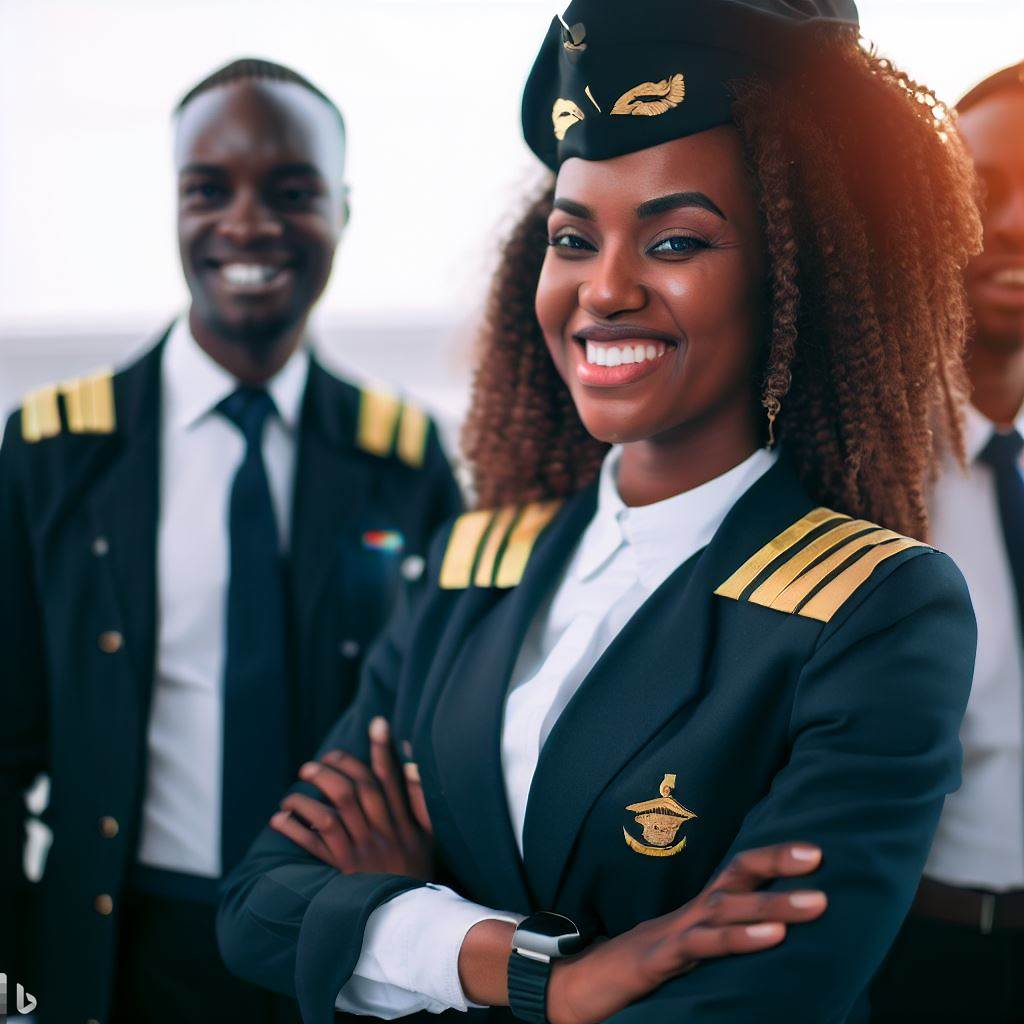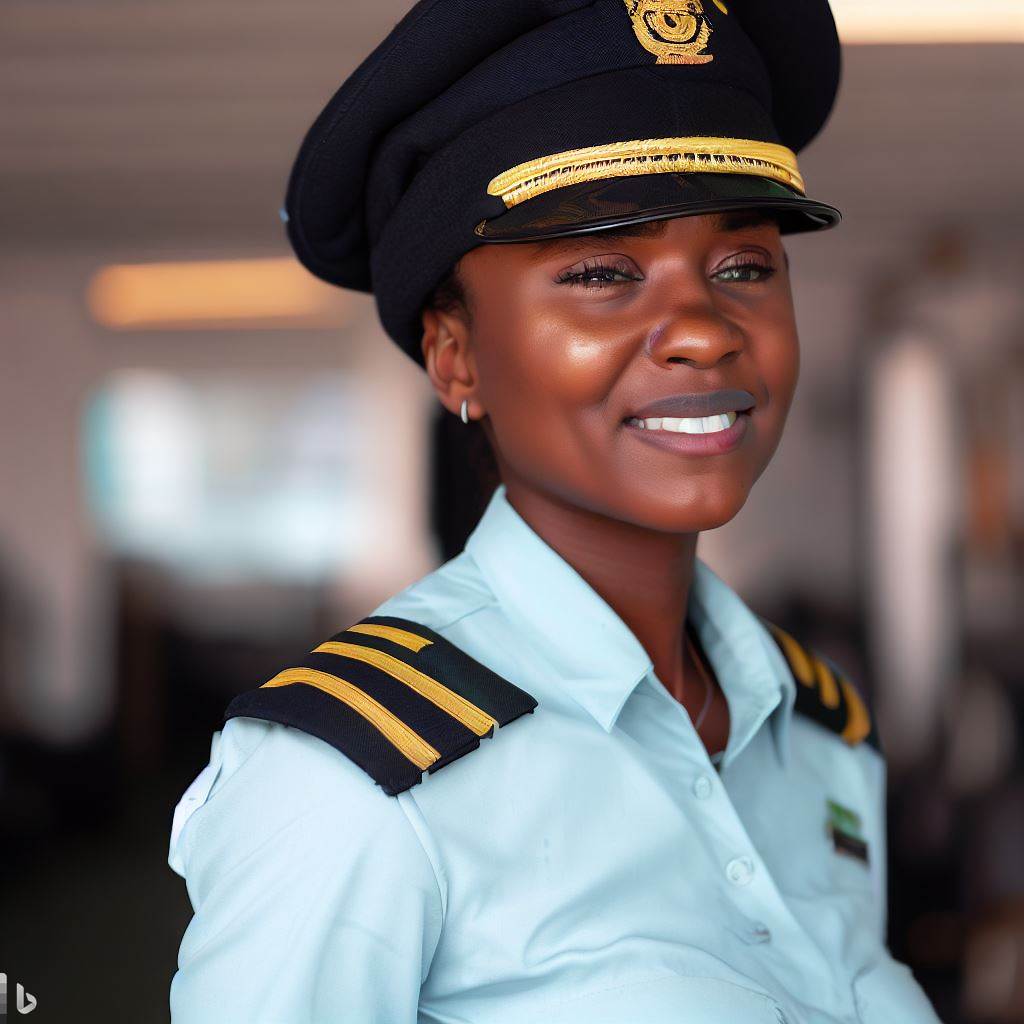Introduction
In a captivating industry like Nigeria’s aviation, female flight engineers are making their mark. This blog presents an overview of the journey of female flight engineers in Nigeria’s aviation industry.
This section aims to highlight the challenges faced by these women in the male-dominated aviation sector in Nigeria.
Female flight engineers in Nigeria’s aviation industry defy gender norms and break barriers, making their mark in a captivating sector. Their journey, however, is not without challenges.
We will explore the experiences and obstacles faced by these exceptional women as they navigate their way through Nigeria’s aviation sector.
Engaging Hook about Female Flight Engineers in Nigeria’s Aviation Industry
Imagine soaring through the skies, breaking stereotypes – the remarkable journey of female flight engineers in Nigeria.
Brief Overview of the Topic
The aviation industry has historically been male-dominated, but more women are pursuing careers as flight engineers.
Thesis Statement Highlighting the Journey and Challenges Faced by Female Flight Engineers in Nigeria’s Aviation Sector
- Breaking Stereotypes: Female flight engineers are challenging gender norms, proving their competence in a male-centric domain.
- Striving for Equality: Despite progress, women face hurdles in achieving equal opportunities and recognition.
- Overcoming Bias: Female flight engineers combat gender bias and work twice as hard to earn respect.
- Encouraging Diversity: Embracing diversity benefits the aviation industry and leads to more innovative solutions.
- Empowering the Future: Inspiring the next generation of female engineers is crucial for a balanced workforce.
This section will explore the inspiring journey of female flight engineers in Nigeria’s aviation sector, highlighting their triumphs and the obstacles they have overcome.
Historical Context of Nigerian Aviation
Brief history of the aviation industry in Nigeria
Since its inception in 1925, the aviation industry in Nigeria has undergone significant growth and development.
It started with the establishment of the Nigerian Airways in 1958 as the national carrier, which operated both domestic and international flights.
However, the industry faced numerous challenges including mismanagement, corruption, and inadequate infrastructure.
Discussion of gender roles and stereotypes in Nigerian society
Nigerian society has traditionally assigned strict gender roles and reinforced harmful stereotypes that limit opportunities for women. Women have been expected to prioritize family and domestic responsibilities, while men are encouraged to pursue careers and higher education.
These societal norms have hindered women from accessing certain fields, including technical roles within the aviation industry.
Lack of female representation in technical roles within the aviation industry
Within Nigeria’s aviation industry, the glaring issue of the lack of female representation in technical roles, like flight engineers, persists. This gender imbalance stems from societal expectations, limited educational opportunities, and industry biases.
The historical context of Nigerian aviation illustrates the industry’s growth and challenges, including mismanagement and inadequate infrastructure.
Societal norms and gender roles have influenced the underrepresentation of women in technical roles. Traditional views emphasize family responsibilities for women, hindering their access to careers in fields like flight engineering.
This gender disparity restricts progress and denies the industry the diverse perspectives and talents that women can offer. To address this, efforts promoting gender equality, such as mentorship programs and scholarships, seek to empower aspiring female flight engineers.
Breaking down stereotypes and biases is essential to foster inclusivity and equal representation in the industry.
By addressing historical challenges and embracing diversity, the aviation sector can create a more inclusive workforce, benefiting both women and the industry’s overall growth.
Read: Exploration vs Production: Oil & Gas Careers in Nigeria Decoded
Rise of Female Flight Engineers in Nigeria
Introduction to the first female flight engineer in Nigeria
The first female flight engineer in Nigeria broke barriers and paved the way for others. She faced many challenges and prejudices but remained determined to pursue her passion.
Her dedication and skills earned her recognition and respect within the aviation industry. The success of the first female flight engineer inspired other women to pursue the same career.
Success stories and achievements of prominent female flight engineers
Several female flight engineers in Nigeria have proven their mettle in the aviation industry. They have achieved significant milestones and are recognized for their exceptional skills and professionalism.
These accomplished women have successfully navigated through a male-dominated field. Their contributions have made a lasting impact on the aviation sector in Nigeria.
Factors that have contributed to the increasing number of female flight engineers in Nigeria
1. Changing societal attitudes and increased recognition of gender equality have played a vital role.
2. Educational opportunities and scholarships specifically aimed at encouraging women in the field of aviation.
3. Mentorship programs and support networks have helped aspiring female engineers overcome challenges.
4. The determination and resilience of these women have shattered stereotypes and expectations.
The rise of female flight engineers in Nigeria is a testament to the determination, resilience, and talents of women in the aviation industry.
The journey of the first female flight engineer and the achievements of prominent female engineers have paved the way for others.
Factors such as changing societal attitudes, educational opportunities, and mentorship programs have contributed to the increasing number of women pursuing this career.
The future looks promising for them in Nigeria as they continue to break barriers and inspire a new generation of aviation professionals.
Read: Environmental Impact Assessor Careers in Nigeria’s Oil Industry
Challenges Faced by Female Flight Engineers
Gender bias and discrimination within the aviation industry
Women often face gender-based bias and discrimination in the male-dominated aviation industry. They may be underestimated or overlooked for promotions and career opportunities due to their gender.
Male colleagues may exhibit biased behavior, such as not taking women’s opinions seriously or excluding them from important discussions and decisions.
The presence of gender bias can create a hostile work environment, making it difficult for female flight engineers to thrive.
It is crucial for the aviation industry to address and eliminate gender-based discrimination to ensure equal opportunities for all.
Stereotypes and societal expectations hindering progress for female flight engineers
Stereotypes surrounding women’s roles in the aviation field can hinder the progress of female flight engineers.
Society often expects women to prioritize family and caregiving responsibilities over their careers, which can limit their professional growth.
There is a prevalent belief that certain jobs, including flight engineering, are more suitable for men, perpetuating the stereotype that women are not as capable.
Such stereotypes can discourage women from pursuing careers in aviation and can also affect their self-confidence and motivation.
Breaking free from societal expectations and stereotypes is essential to create a more inclusive and diverse aviation industry.
Lack of mentorship and support networks for aspiring female flight engineers
Female flight engineers often face a lack of mentorship and support networks, which can impede their professional development.
Without guidance from experienced professionals, aspiring female flight engineers may struggle to navigate the challenges specific to their gender.
Mentorship programs and support networks play a vital role in providing guidance, advice, and opportunities for career advancement.
Having access to mentors who have successfully overcome similar challenges can greatly benefit aspiring female flight engineers.
It is essential for the aviation industry and relevant organizations to establish mentorship programs and support networks to empower and uplift them.
Ultimately, female flight engineers in Nigeria’s aviation industry face various challenges that hinder their progress and opportunities.
Gender bias and discrimination, stereotypes, and the lack of mentorship and support networks are significant obstacles.
It is crucial for the industry to address these challenges and create an inclusive and supportive environment for aspiring and current female flight engineers.
By promoting equality and providing necessary support, the aviation industry can unlock the full potential of female talent and contribute to the growth and success of the industry as a whole.
Read: Reservoir Simulation Engineer: An In-depth Look at Nigerian Prospects

Efforts Towards Gender Equality in Nigerian Aviation
Legislative measures and policies promoting gender equality
The Nigerian government has implemented various legislative measures aimed at promoting gender equality in the field of aviation.
One such measure is the passage of the Nigeria Gender Policy in Aviation, which outlines strategies for enhancing diversity and inclusion.
This policy encourages equal employment opportunities for both men and women in aviation, including the field of flight engineering.
Additionally, the Nigerian Civil Aviation Authority (NCAA) has developed policies that ensure gender equality and address any form of discrimination.
These policies not only promote equal opportunities but also provide a safe and supportive environment for them.
Initiatives and organizations supporting the advancement of female flight engineers
Several initiatives and organizations have been instrumental in supporting the advancement of female flight engineers in Nigeria’s aviation industry.
The Association of Nigerian Women in Aviation (ANWA) is an organization dedicated to promoting gender equality in the aviation sector.
ANWA provides mentorship programs, scholarships, and networking opportunities for aspiring female flight engineers.
Another notable initiative is the Women in Aviation International (WAI) Nigerian Chapter, which focuses on empowering women in aviation.
WAI offers mentorship programs, career guidance, and scholarships specifically for female flight engineers.
These initiatives play a crucial role in encouraging more women to pursue careers in flight engineering.
Impact of cultural shifts and changing mindsets on gender equality within the industry
Alongside legislative measures and support from organizations, cultural shifts and changing mindsets have contributed to gender equality in Nigerian aviation.
Over the years, traditional gender roles and stereotypes have gradually evolved, allowing more women to pursue careers in male-dominated fields.
As society becomes more progressive, there is a growing recognition of the value and capabilities that women bring to the aviation industry.
Cultural shifts have also led to increased acceptance and respect for them, promoting a more inclusive work environment.
Moreover, the success stories of pioneering female flight engineers have inspired and motivated future generations of women.
These shifting cultural perspectives and changing mindsets are fostering an environment that is more conducive to gender equality within the aviation industry.
In general, efforts towards gender equality in Nigerian aviation are multi-faceted, involving legislative measures, supportive policies, initiatives, organizations, and changing cultural mindsets.
Through these combined efforts, the industry is striving to create equal opportunities for them and promote an inclusive and diverse workforce.
As progress continues, it is crucial to sustain these efforts and further encourage women to pursue careers in aviation, ultimately leading to a more equitable industry for all.
Read: Top Banking and Finance Certifications in Nigeria
You Might Also Like: Nigeria’s Oil Industry: Impact of Petroleum Engineers
Delve into the Subject: Insights into the Daily Life of an Electrical Engineer in Nigeria
Inspiring Success Stories
Profiles and narratives of successful female flight engineers in Nigeria
- Ruth Okigbo – A trailblazer in the aviation industry, Ruth has been a flight engineer for over 15 years.
- Maryam Abdullahi – With a passion for airplanes since childhood, Maryam became Nigeria’s first female flight engineer.
- Chinwe Adebayo – Chinwe’s determination and hard work led her to become a respected flight engineer in the country.
- Grace Nwosu – Grace’s love for mathematics and physics paved the way for her successful career as a flight engineer.
- Amaka Obi – Despite facing challenges and stereotypes, Amaka’s perseverance made her a respected figure in the aviation industry.
Highlighting their accomplishments and contributions to the aviation industry
- Ruth Okigbo has played a crucial role in ensuring the safety and efficiency of flights, contributing to the growth of the industry.
- Maryam Abdullahi’s groundbreaking achievement opened doors for more women to pursue careers in aviation.
- Chinwe Adebayo’s expertise in handling complex aircraft systems has made her an invaluable asset to her airline.
- Grace Nwosu’s exceptional problem-solving skills have helped avert potential disasters, saving lives and aircraft.
- Amaka Obi’s dedication and professionalism have set high standards for them in Nigeria.
Illustrating the potential for growth and empowerment of female flight engineers
The success stories of these female flight engineers in Nigeria serve as an inspiration to aspiring women in the aviation industry.
By showcasing their accomplishments, more opportunities can be created for women to excel in technical roles.
Increased representation of female flight engineers will challenge stereotypes and create a more inclusive industry.
They bring unique perspectives and skills, enhancing the overall performance of aviation organizations.
With proper support and encouragement, more women can pursue careers as flight engineers, contributing to the growth of the industry.
Overall, the remarkable journeys of these successful female flight engineers in Nigeria demonstrate the potential for women to thrive and excel in the aviation industry.
Their profiles and narratives reveal their determination, expertise, and contributions to the field, inspiring aspiring female engineers.
By highlighting their accomplishments and showcasing their success, more opportunities and inclusivity can be fostered in the industry.
It is crucial to empower and support their growth, recognizing the value they bring to aviation organizations. With a brighter future ahead, the journey of female flight engineers in Nigeria is on an inspiring trajectory.
Future Prospects and Recommendations
The future outlook for female flight engineers in Nigeria’s aviation industry
The future prospects for female flight engineers in Nigeria’s aviation industry look promising.
As awareness about gender equality and women empowerment continues to grow, more opportunities will open up for women in traditionally male-dominated fields like aviation.
Recommendations for stakeholders to further promote gender equality and support female flight engineers
- Encourage female mentorship programs: Stakeholders should establish mentorship programs where experienced female flight engineers can guide and support aspiring women in the field.
- Provide equal opportunities: Companies and organizations should ensure that the recruitment and selection process for flight engineers is fair and unbiased, giving equal opportunities to both men and women.
- Offer scholarships and training programs: Stakeholders should provide scholarships and training programs specifically designed for women interested in becoming flight engineers. This would encourage more women to pursue careers in aviation.
- Create awareness campaigns: Promote gender equality through awareness campaigns that highlight their achievements and contributions. This will inspire more women to consider aviation as a career option.
- Implement policies and procedures: Establish policies and procedures that promote gender equality in the workplace, including addressing any instances of discrimination or harassment faced by them.
Envisioning a future where gender is not a barrier to success in the aviation sector
In the future, we envision a Nigeria’s aviation industry where gender is not a barrier to success for female flight engineers.
Women will be equally represented in all roles, from pilots to engineers, and their skills and expertise will be recognized and valued.
The industry will celebrate diversity and make concerted efforts to encourage and empower more women to pursue careers in aviation.
Gender equality will be deeply ingrained in the culture of the industry, with equal pay, equal opportunities, and equal recognition for all professionals.
By addressing existing challenges, implementing supportive policies, and promoting an inclusive mindset, Nigeria’s aviation industry can become a leader in promoting gender equality.
Publish Your Professional Profile, Business or Brand
Showcase your expertise, gain trust, and boost visibility instantly on Professions.ng.
Publish NowTogether, stakeholders can create an environment where they thrive and contribute to the growth and development of the sector.
As we move forward, let us work towards breaking down barriers, challenging stereotypes, and embracing diversity.
Let us create a future where their journey in Nigeria’s aviation is not only possible but also celebrated.
Conclusion
The journey of female flight engineers in Nigeria’s aviation industry has been marked by numerous challenges.
It is important to affirm and promote gender equality in this field to create a fair and inclusive environment.
In closing, let us support and uplift them in Nigeria, encouraging their participation and striving for equal opportunities.
Female flight engineers in Nigeria’s aviation industry face numerous challenges, demanding gender equality promotion.
Affirming and promoting equality creates a fair and inclusive environment for all.
Support and uplift them, encouraging their participation and striving for equal opportunities.
Together, let’s pave the way for a more balanced and prosperous aviation industry in Nigeria.




